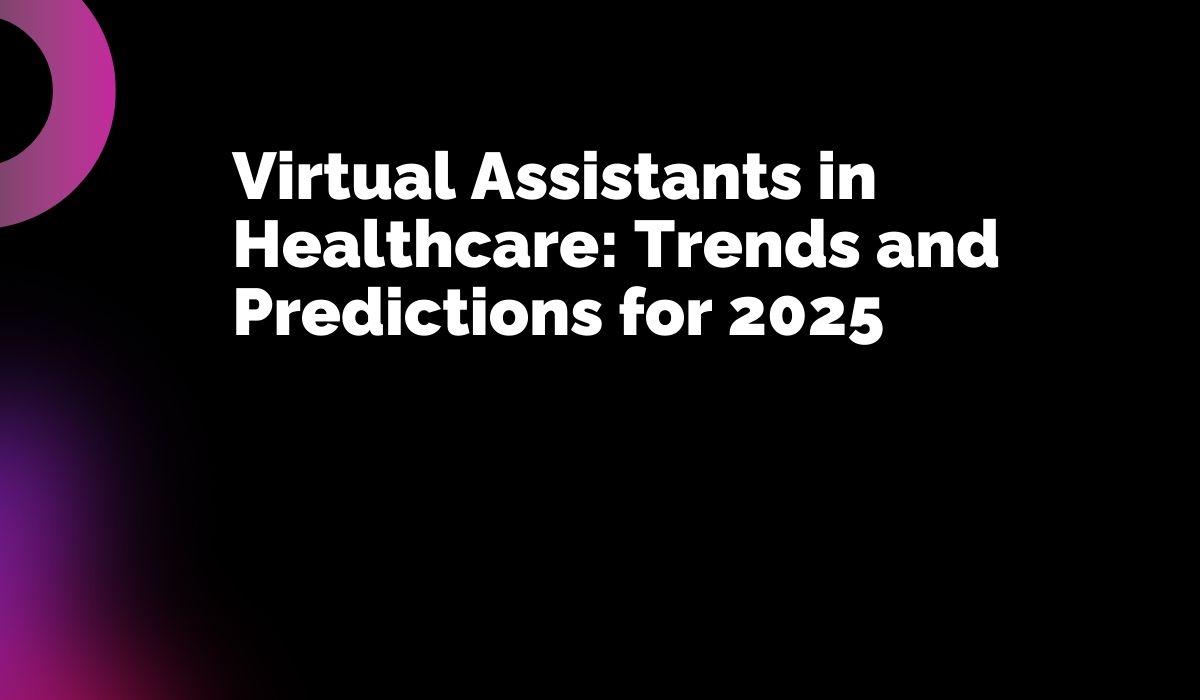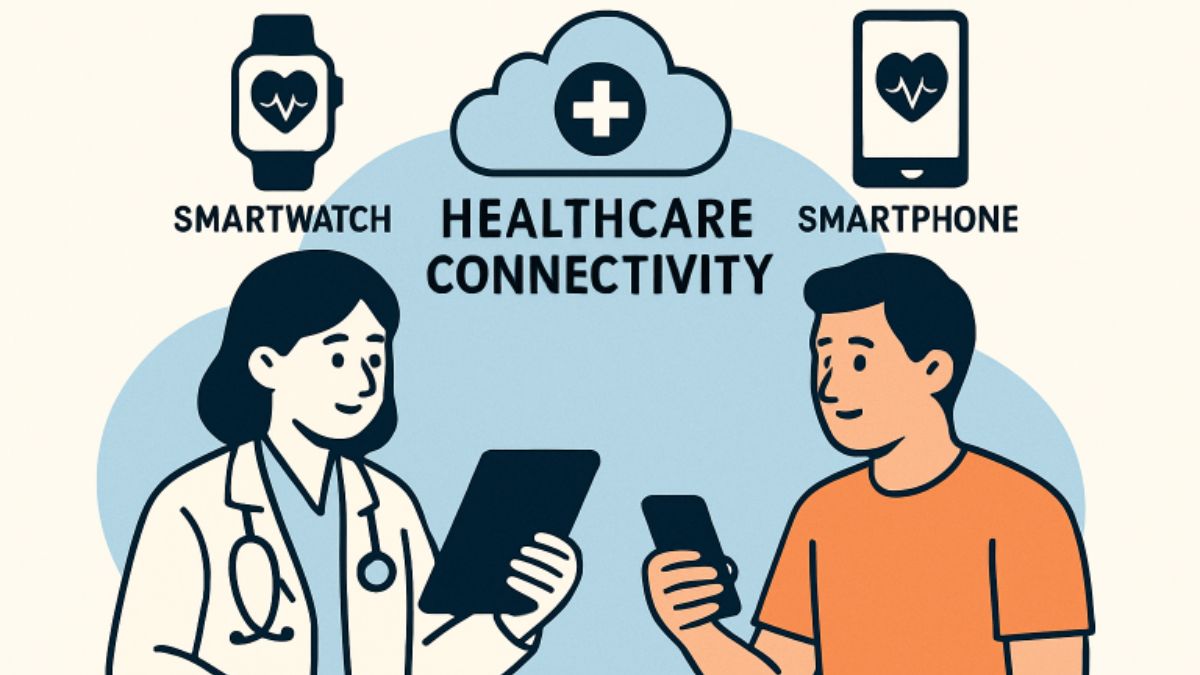Health
Virtual Assistants in Healthcare: Trends and Predictions for 2025

The healthcare industry is rapidly evolving, and technology continues to play a crucial role in enhancing patient care, reducing costs, and improving overall efficiency. One of the most significant innovations in recent years is the rise of Virtual Assistant for Healthcare. As we look ahead to 2025, the role of virtual assistants in healthcare is expected to expand, offering greater support to both healthcare professionals and patients. In this article, we will explore the trends and predictions for virtual assistants in healthcare for the year 2025.
What Are Virtual Assistants in Healthcare?
Virtual assistants (VAs) in healthcare refer to AI-powered tools designed to assist healthcare providers and patients with various tasks. These tasks can range from scheduling appointments, managing patient records, answering patient inquiries, to providing medication reminders, and even helping doctors make informed decisions by analyzing medical data. One such service is Express Virtual Assistant, which offers specialized virtual assistant solutions tailored for the healthcare sector.
Virtual assistants leverage AI, machine learning, and natural language processing (NLP) to mimic human interactions and provide support that improves the patient experience and enhances the efficiency of healthcare practices. By automating repetitive tasks, VAs free up healthcare professionals to focus more on direct patient care, while ensuring that administrative tasks are handled seamlessly.
Key Trends Driving the Growth of Virtual Assistants in Healthcare
As we approach 2025, several trends are shaping the future of virtual assistants in healthcare. These trends reflect the increasing adoption of digital tools, growing patient expectations, and the need for better healthcare delivery.
1. Increased Integration with EHR Systems
Electronic Health Records (EHR) are essential to modern healthcare, and virtual assistants are becoming increasingly integrated with these systems. In 2025, it’s predicted that virtual assistants will be able to access patient data from EHRs more efficiently, offering real-time information to healthcare providers. This integration will enable VAs to automatically update patient records, track medical history, and streamline administrative tasks.
For healthcare professionals, this means more time spent on patient care, and for patients, it means more accurate and timely updates about their health.
2. Enhanced Patient Engagement
Patient engagement has always been a priority in healthcare, but with the rise of virtual assistants, it will reach new heights in 2025. Virtual assistants will play an essential role in improving the patient experience by offering personalized health advice, answering questions about symptoms, and reminding patients of appointments or medication schedules. They can even follow up with patients to ensure they are adhering to treatment plans, contributing to better health outcomes.
By 2025, we can expect virtual assistants to utilize data from wearable health devices to provide real-time insights and recommendations, making it easier for patients to manage chronic conditions such as diabetes or hypertension.
3. Voice-Activated Assistants
The use of voice-activated technology is one of the most significant trends in the healthcare industry. Virtual assistants that can respond to voice commands, like Amazon’s Alexa or Google Assistant, are already being adopted in various healthcare settings. In 2025, these voice-activated assistants will become even more sophisticated, allowing healthcare professionals to dictate notes, schedule appointments, and access patient data hands-free.
Voice-enabled assistants will be particularly helpful for doctors and nurses in busy hospital settings where they need to multitask while interacting with patients or updating records.
4. Telemedicine Support
Telemedicine has become a significant part of healthcare, especially following the global pandemic. By 2025, virtual assistants will play a pivotal role in telehealth services. They will be able to assist in scheduling virtual appointments, conducting initial patient assessments, and even triaging medical conditions based on symptoms.
Moreover, virtual assistants will help healthcare providers manage telemedicine platforms more efficiently, ensuring that patients have a seamless experience during virtual consultations.
5. AI-Driven Decision Support
AI-driven decision support systems are rapidly becoming an indispensable tool for healthcare professionals. In 2025, virtual assistants will evolve to provide doctors with more advanced AI-powered decision support, analyzing medical data, lab results, and clinical notes to offer recommendations based on best practices and current medical guidelines.
These assistants will aid in diagnosing conditions, predicting patient outcomes, and even suggesting treatments, all while reducing the chances of human error.
Predictions for Virtual Assistants in Healthcare by 2025
1. Widespread Adoption Across All Healthcare Sectors
By 2025, virtual assistants will become a standard feature in healthcare practices, hospitals, and clinics worldwide. As AI and machine learning technologies advance, healthcare providers will increasingly rely on virtual assistants to streamline operations, reduce administrative burdens, and improve patient care. From primary care to specialized medical fields, VAs will play a critical role in almost every aspect of healthcare delivery.
2. Greater Customization and Personalization
As AI systems become more sophisticated, virtual assistants will provide a more personalized healthcare experience. These assistants will be able to learn from individual patients’ preferences, medical histories, and behaviors to offer tailored support. For example, a virtual assistant might recommend specific lifestyle changes based on a patient’s unique health data, making healthcare more proactive and personalized.
3. Improved Data Security and Privacy
With the integration of virtual assistants comes an increased need for robust data security and privacy measures. By 2025, virtual assistants in healthcare will be equipped with advanced security features to protect sensitive patient data. Blockchain technology and end-to-end encryption are expected to play a significant role in ensuring the confidentiality and integrity of patient information, while still allowing seamless interaction with healthcare professionals.
4. Collaborative Workflow for Healthcare Teams
Virtual assistants will also help foster more collaborative workflows among healthcare teams. In 2025, VAs will assist in coordinating care across multiple specialists, ensuring that all team members have access to the same up-to-date information. By acting as a bridge between different medical professionals, virtual assistants will help create a more cohesive and streamlined healthcare experience for patients.
5. Cost-Effective Solutions for Healthcare Providers
With healthcare costs rising, virtual assistants will provide an affordable solution for healthcare providers looking to enhance efficiency and reduce overhead costs. By automating administrative tasks and reducing the need for extensive human resources, virtual assistants will save healthcare organizations money while improving patient care. As the technology matures, the cost of implementing virtual assistants will decrease, making them accessible to more healthcare settings.
Conclusion
Virtual assistants are poised to revolutionize healthcare by 2025, offering a wide range of benefits to healthcare providers and patients alike. From streamlining administrative tasks to enhancing patient engagement and improving decision support, VAs will become an indispensable part of the healthcare ecosystem. As AI and machine learning technologies continue to advance, the role of virtual assistants in healthcare will only grow, making healthcare more efficient, personalized, and accessible for everyone.
Health
Safe and Supportive Pediatric Positioning for Rehabilitation

Ensuring that children are safely and comfortably positioned during rehabilitation is crucial to their recovery, health, and quality of life. Optimal positioning helps support physiologic functions, prevents secondary complications, and enhances each child’s participation in daily activities. For families and caregivers, selecting the right pediatric rehab equipment can significantly improve their child’s outcomes and comfort during this journey.
Thoughtful pediatric positioning not only provides immediate benefits in comfort and safety but also helps develop proper posture, prevent contractures, and avoid pressure injuries. With the right strategies and resources, the home environment can be a safe and effective setting for ongoing rehabilitation. It is vital for parents and support teams to understand and implement evidence-based techniques to feel confident in their approach.
Importance of Proper Positioning
Pediatric rehabilitation focuses on helping children achieve their highest level of independence while ensuring their safety and comfort. Proper positioning is essential for preventing pressure sores, improving respiratory function, and enhancing overall well-being. For children with limited mobility or developmental challenges, safe positioning can make everyday activities less stressful and reduce the likelihood of health complications.
Children with special needs may be at increased risk for pressure injuries, joint contractures, and respiratory issues if not properly supported. Consistent positioning strategies can prevent deformities by preserving joint range of motion and supporting muscle tone. Families can work with rehabilitation professionals to develop individualized plans tailored to their child’s unique medical and therapeutic requirements.
Effective positioning also improves a child’s engagement with their environment and enables them to participate fully in play, therapy, and social interactions. According to the American Physical Therapy Association, early and active positioning can also aid in overall child development, aligning with critical milestones in physical growth and function.
Common Positioning Techniques
There are several essential positioning techniques regularly employed by caregivers and therapists in pediatric rehabilitation. Each technique offers specific benefits based on the child’s needs, and all require proper assessment to maximize results and mitigate risks.
- Supine Position: The child lies on their back with their head supported. This position helps maintain spinal alignment, allows for relaxation, and simplifies monitoring of breathing and muscle tone.
- Prone Position: The child lies on their stomach, which encourages head lifting and strengthens the neck, back, and shoulder muscles. Prone positioning can also expand lung capacity and assist in digestive health.
- Side-Lying Position: Lying on the side with padding to maintain posture can relieve pressure on specific areas, provide comfort, and facilitate certain therapeutic activities.
Therapists may also recommend alternative techniques, such as supported sitting or upright standing (with assistive aids), depending on rehabilitation goals. The right strategy depends on continual assessment and the child’s evolving health status.
Assistive Devices for Positioning
Assistive devices enable caregivers to safely position children who may otherwise be unable to maintain alignment independently. Selecting the correct device improves comfort, enhances function, and prevents undue stress on muscles and joints.
- Positioning Aids: Wedges, rolls, bolsters, and foam supports help maintain or correct posture, especially when lying or sitting for extended periods.
- Adaptive Seating: Customized seats, often with harnesses or contoured bases, provide stability and promote proper alignment of the pelvis and trunk, thereby significantly improving function and interaction with the environment.
- Orthotic Devices: Splints and braces are recommended for children at risk of muscle contractures or skeletal deformities. These are fitted to the child and are often used in therapeutic routines under supervision.
Professional assessment is critical before choosing and using any assistive device, as improper use can lead to discomfort or even harm.
Guidelines for Safe Positioning at Home
Translating hospital or clinic protocols to the home environment is an essential part of pediatric rehabilitation. Caregivers should adopt best practices to ensure safety while promoting the child’s participation and independence.
- Change the child’s position every two hours to prevent the development of pressure injuries or sores.
- Always check and maintain alignment of the head, neck, and spine with appropriate support for the limbs.
- Use soft, supportive pillows and cushions to stabilize positioning and maximize comfort.
- Monitor frequently for signs of red or irritated skin, pain, or swelling, and adjust the position accordingly.
- Communicate with your child throughout the process to encourage engagement and recognize discomfort early.
Role of Physical Therapy in Positioning
Physical therapists are essential partners in a child’s rehabilitation journey. From the initial evaluation, therapists help identify positioning needs and collaborate with families to design safe positioning routines and select optimal equipment. They also adapt strategies over time, ensured by regular follow-up to address the child’s changing needs.
Therapy sessions often incorporate both passive and active positioning so children can participate directly, while caregivers observe and learn techniques to replicate at home. Ongoing physical therapy involvement results in improvements in muscle strength, range of motion, and overall participation that are both measurable and noticeable in daily life.
Monitoring and Adjusting Positioning Strategies
Continuous assessment is a crucial part of pediatric positioning. Both caregivers and clinicians must remain vigilant for early signs of discomfort, pressure injuries, or unintended consequences of specific aids or techniques. Frequent feedback from the child and team discussions helps ensure that strategies remain effective and adapt to new challenges as the child grows or recovers.
If issues arise, such as redness, indentations, or pain, caregivers should immediately reassess and seek guidance from their healthcare team. Thorough documentation and open communication among all care providers will support timely adjustments, preventing future complications and supporting an optimal recovery trajectory.
Conclusion
A secure and encouraging positioning strategy is crucial for achieving positive outcomes in pediatric rehabilitation. Recognizing the significance of correct positioning, utilizing suitable methods, and collaborating with physical therapists and other professionals in the care plan allows children to experience increased comfort, improved function, and a higher quality of life. Regular use of top-quality pediatric rehabilitation equipment, family education, and careful monitoring help make each child’s rehabilitation process as safe and effective as possible.
Health
Advances in Patient-Focused Healthcare Solutions

The modern healthcare landscape is rapidly evolving, with new technologies emerging to address the pressing needs of patients worldwide. Hospitals, clinics, and healthcare providers are increasingly turning to digital innovations, such as electronic health records and artificial intelligence, to deliver more efficient and tailored services. These cutting-edge approaches empower individuals to become active participants in their care while enhancing the quality and accessibility of treatment for everyone involved. For those seeking the latest updates and offerings in pharmaceutical products Canada, technology-driven healthcare transformation is having a direct impact on the industry.
By investing in solutions that prioritize patient experiences and personalized outcomes, medical professionals are better equipped to diagnose, treat, and monitor a wide spectrum of health conditions. Advanced tools not only speed up diagnosis but also open new opportunities for delivering remote care and real-time patient engagement, all while maintaining a focus on individual needs.
These advancements are also paving the way for more holistic and comprehensive patient management strategies. Whether through remote monitoring devices, digital health platforms, or advanced analytics, the collective goal is to create a patient-centered healthcare system that is responsive, accessible, and adaptive to the changing demands of modern society.
Patients today are more informed than ever before, thanks to the digital revolution and increasing emphasis on patient education. This shift in focus not only fosters trust and collaboration between patients and their healthcare providers but also ensures that care is more responsive to unique individual circumstances and preferences.
Artificial Intelligence in Healthcare
Artificial intelligence is revolutionizing the way healthcare providers deliver patient care. By leveraging advanced algorithms, AI-powered tools can process vast amounts of medical data in real time. This leads to earlier and more accurate diagnoses for conditions such as sepsis, cancer, and cardiovascular disease, helping to lower mortality and morbidity rates. According to Forbes, AI applications are projected to save the healthcare economy $150 billion by 2026.
Mobile Health Solutions
Mobile health (mHealth) applications are bringing healthcare directly into patients’ hands, transforming access and engagement. These platforms allow users to easily communicate with providers, schedule appointments, and receive timely reminders, all from their mobile devices. Secure messaging and medical record access have greatly improved patient satisfaction, allowing individuals to be at the center of their care process. Companies and clinics leveraging mHealth can offer more responsive support and build lasting, trust-based relationships with their patients.
Wearable Technology
Wearable technologies are changing the landscape of continuous health monitoring and disease prevention. Devices such as fitness trackers, smartwatches, and medical-grade biosensors monitor vital signs and behaviors around the clock, providing actionable insights both to the user and their healthcare provider. Patients can now track their heart rate, blood pressure, sleep patterns, and more, using this data to stay informed about their health and intervene earlier when issues arise. The use of wearables enhances clinicians’ ability to craft personalized treatment plans based on real-time information collected outside traditional clinical settings.
Interactive Patient Care Systems
Interactive patient care (IPC) systems bring an innovative and engaging element to the patient experience, especially during hospital stays. These in-room technologies provide access to educational content, entertainment, and real-time feedback tools, all designed to foster a positive and informed environment for recovery. IPC systems can sync with electronic health records to deliver tailored educational modules specific to an individual’s condition, medication, or aftercare needs. This increased engagement has been shown to drive better health outcomes through improved compliance and patient satisfaction.
Point-of-Care Innovations
Point-of-care (POC) technologies are transforming immediate care delivery by enabling diagnostics and therapeutic interventions at the site of patient care. Tools such as portable diagnostic devices, rapid test kits, and cloud-connected platforms eliminate unnecessary delays associated with central laboratory processing, streamlining workflows and enabling quicker decision-making. These technologies ensure timely interventions, reduce the burden on healthcare systems, and help patients achieve better health outcomes by accelerating the entire care process. Point-of-care innovations are particularly important in emergency departments, rural locations, and underserved communities where access to centralized resources may be limited.
Challenges and Considerations
Despite remarkable progress, patient-focused healthcare advancements also bring significant challenges. Patient data security and privacy remain top concerns, particularly as more information is transferred between devices and stored in the cloud. Interoperability between different healthcare technologies, electronic records, and platforms is also critical for creating seamless patient experiences. Additionally, ensuring equitable access to these innovations is vital to prevent disparities and ensure that everyone benefits from technological progress. Health systems must remain vigilant in addressing these obstacles to build a strong, sustainable future for patient-centric care.
Conclusion
Ongoing advances in patient-focused healthcare solutions are reshaping how care is delivered, with technology playing a central role in driving accessibility, responsiveness, and personalization. By prioritizing innovations that empower both patients and providers, the healthcare industry is moving closer to realizing its vision of comprehensive, high-quality care for all. As more individuals tap into these technologies, the promise of better health, improved experiences, and enhanced outcomes becomes an achievable reality.
Health
The Power of Gentle Fitness Classes for Confidence and Mobility in Later Years

Why Fitness Matters in Later Years
Maintaining fitness in later years is crucial for overall health and quality of life. Regular physical activity helps preserve muscle mass, improve balance, and maintain joint flexibility, reducing the risk of falls and injuries. Beyond the physical benefits, exercise supports cardiovascular health, aids in weight management, and promotes better sleep patterns. Staying active can also boost mental well-being by reducing stress, enhancing mood, and sharpening cognitive function, making daily tasks easier and more enjoyable.
For older adults seeking guidance and motivation, working with a certified professional can make a significant difference. Programs such as personal training Reston VA offer tailored exercise plans that accommodate individual fitness levels and goals. Personalized support ensures safe, effective routines that maximize results and help maintain independence and vitality as you age.
Gentle Fitness Classes: Options and Benefits
Tai Chi: Balance, Calmness, and Coordination
Tai Chi is a practical, gentle exercise for seniors, often referred to as “meditation in motion.” It features slow, deliberate movements and focused breathing, making it accessible to everyone. Regular practice enhances balance, flexibility, and posture, thereby reducing the risk of falls and promoting independent living as one ages.
Water-Based Exercise: Joint-Friendly and Fun
Water-based exercises, such as swimming and water aerobics, are beneficial for aging joints because buoyancy reduces impact and the risk of injury. They help individuals with osteoarthritis or mobility issues strengthen their muscles and improve their heart health without experiencing pain. These exercises support joint movement, lower blood pressure, promote heart health, and aid weight management. Group classes add social fun with music and games.
Strength Training: Energy, Balance, and Independence
Strength training helps seniors counteract muscle loss with simple exercises, such as chair squats and wall push-ups, that improve movement, balance, posture, and overall energy. Regular, guided classes ensure safety, motivation, and progress, leading to better ability and confidence to enjoy activities.
The Social and Emotional Impact of Group Classes
Participating in group fitness classes greatly boosts social involvement and emotional health among seniors. These classes not only improve physical health but also reduce loneliness by building bonds among peers with similar objectives. The friendship and camaraderie fostered encourage ongoing participation and strengthen a sense of community. The encouraging environment motivates members, and social events centered around fitness add extra meaning to their lives outside the gym.
Getting Started Safely
Begin exercising with guidance from a doctor or trainer, especially if you have health concerns. Safety is key, so consult with an expert to plan your activity. Community centers and gyms typically offer beginner classes for seniors, featuring trained instructors who can modify exercises to accommodate different mobility levels. Start slowly, pay attention to how your body responds, and keep a consistent routine. Gentle activities, such as Tai Chi, yoga, or water aerobics, can improve your health, foster social connections, and help you appreciate nature. Wear comfortable clothing, stay well-hydrated, and celebrate your progress, no matter how small.
Conclusion
Embracing gentle fitness classes in later years provides benefits that extend far beyond the physical. These programs support mobility and independence, enrich social lives, strengthen emotional health, and help preserve confidence for whatever challenges or adventures the future may hold. No matter your current fitness level, there’s a class or activity that can help you progress—with strength, balance, and joy, making every stage of life vibrant and fulfilling.
-

 Entertainment10 months ago
Entertainment10 months agoEnchantment & Excitement: Crafting Unforgettable Event Experiences
-

 GENERAL1 year ago
GENERAL1 year agoFrom Fan Art to Original Works: The Diversity of doujindesu Creations
-

 GENERAL12 months ago
GENERAL12 months agoEngland Business Visa Requirements for American and International Citizens in 2025: A Guide for Entrepreneurs
-

 GENERAL10 months ago
GENERAL10 months agoCrossword Conundrum: The Significance of vault opener nyt crossword
-

 GENERAL1 year ago
GENERAL1 year agoLatest Trends in Men’s and Women’s Jackets for the Upcoming Season
-

 GENERAL10 months ago
GENERAL10 months agoExploring the World of nhentai.nef: A Comprehensive Guide for New Users
-

 Health1 year ago
Health1 year agoDiscovering gel ooru: The Ultimate Guide to This Unique Traditional Craft
-

 Fashion11 months ago
Fashion11 months agoBest Shampoos and Treatments from OZ Hair and Beauty for Thinning Hair: Strengthen and Revitalize Your Strands
